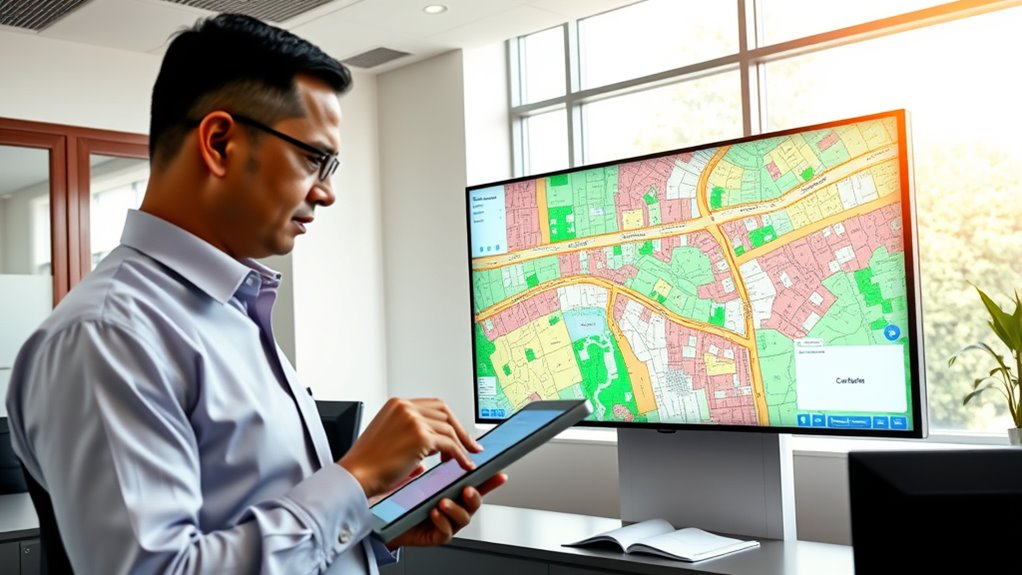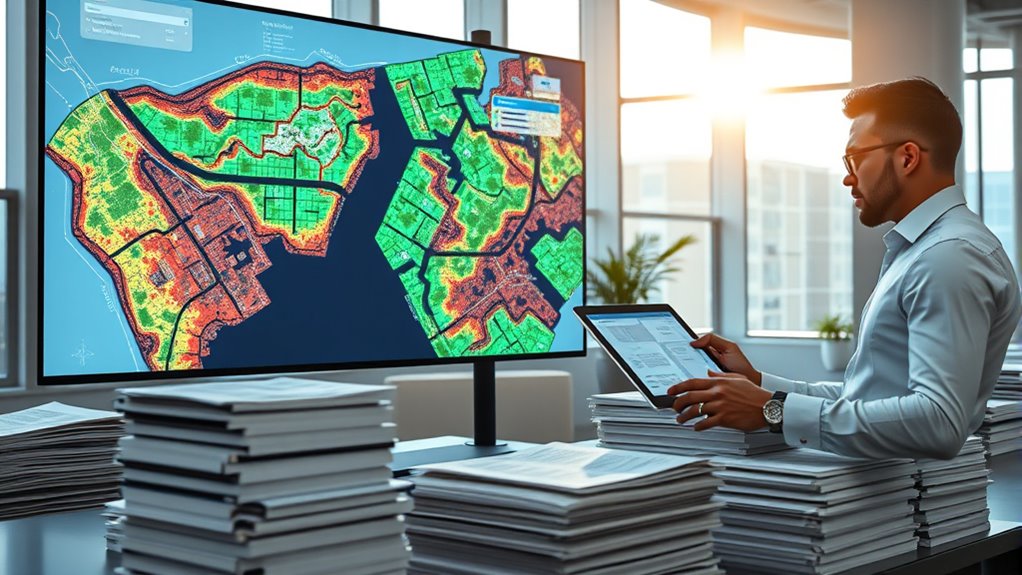Digitising land records and deeds makes property management more transparent, secure, and accessible. It reduces disputes by providing tamper-proof titles, speeds up transactions, and enhances data sharing across agencies for urban planning and taxation. Countries like India and Bangladesh are making significant progress, adopting best practices to guarantee privacy and security. As digital records expand, they foster trust and attract investment. Keep exploring to discover how these innovations shape land management worldwide.
Key Takeaways
- Digitisation makes land records more transparent, tamper-proof, and easier to verify, reducing property disputes.
- It enables quick, reliable access to accurate land information, streamlining property transactions and urban planning.
- Digital records support data sharing among agencies, improving governance, taxation, and citizen empowerment initiatives.
- Countries like India and Bangladesh have digitized millions of land records, enhancing transparency and reducing fraud.
- Ensuring data security and privacy through governance frameworks is crucial for trustworthy and inclusive land record digitisation.
The Rationale Behind Digitizing Land Data

Digitizing land data is essential because it enhances transparency and reduces disputes over property ownership. When records are digital, you gain quick, reliable access to accurate information, minimizing the chances of fraud or errors. Digital systems make it easier to verify ownership, streamline transactions, and prevent forgery, saving time and money. By standardizing data formats, you also facilitate easier sharing between agencies, which improves coordination in urban planning, taxation, and development projects. Furthermore, digital records protect against physical deterioration, loss, or damage that paper documents can suffer. This ensures you have a secure, permanent record of land information. Ultimately, digitization empowers citizens, reduces corruption, and builds trust in land administration processes, making land management more efficient and transparent for everyone involved.
Global Benchmarks and Successful Models

Many countries have set global benchmarks by developing integrated, secure, and user-friendly land record systems that enhance transparency and efficiency. Singapore’s e-services platform offers seamless access to land information, reducing disputes and improving service delivery. Estonia’s e-Land Register stands out for its robust cybersecurity and digital integration, enabling citizens and businesses to verify property details online securely. These models demonstrate the importance of standardization, interoperability, and data security. They also highlight how digital systems can accelerate land transactions, promote transparency, and foster trust among users. Successful models emphasize the need for legal frameworks supporting digital signatures and data privacy. Additionally, implementing digital identity verification is crucial for ensuring secure and trustworthy access to land records. Incorporating financial stability assessments can further enhance user confidence in digital land management systems. By studying these benchmarks, you can identify best practices to adapt and implement tailored solutions that meet your country’s unique land management challenges.
Current Progress in India’s Land Record Modernization

India has made significant progress in digitizing rural land records, with over 99.8% of rural records already converted, bringing transparency and efficiency. However, efforts to expand urban land record digitization are still underway, as urban areas lag behind rural regions. Achieving full coverage requires focused expansion and integration across all land sectors. Incorporating advanced digital technologies can further enhance data privacy and data security in land record management. Additionally, implementing comprehensive policies can streamline the process and ensure consistent standards across regions. Emphasizing cultural and regional considerations can also facilitate better acceptance and implementation of digital land records, especially as different areas adopt various denki fridges or other appliances to support modernized infrastructure.
Rural Digitization Milestones
Significant progress has been made in rural land record digitization under India’s Land Record Modernization Programme, bringing the goal of full digital coverage closer to reality. Over 99.8% of rural land records, encompassing approximately 379 million records, have been digitized, streamlining land management. Nearly 90% of revenue courts and all sub-registrar offices are computerized, improving efficiency and transparency. The integration of Aadhaar linkage enhances identity verification and reduces fraud. The government allocated ₹875 crore between 2021 and 2026 to expand digital efforts. Despite these advancements, challenges remain in regions with community land ownership, like Northeast India and Ladakh, where legal and cultural factors complicate digitization. Incorporating data-driven comparisons helps stakeholders make informed decisions about digital land records. Digital infrastructure development is essential to support ongoing and future digitization initiatives. Additionally, understanding the historical land use patterns can assist in resolving land disputes and planning sustainable development. Moreover, establishing standardized data formats is crucial to ensure interoperability across various systems and agencies. Overall, rural digitization markedly improves record accuracy, reduces disputes, and accelerates land transactions.
Urban Records Expansion
While rural land records have seen remarkable digitization progress, urban areas still lag behind in the modernization effort. Urban record expansion faces challenges like complex property types, high transaction volumes, and outdated infrastructure. To address this, India is prioritizing urban digitization after rural completion. Cities are adopting integrated digital platforms, linking records with Aadhaar and other databases. Moreover, these efforts are inspired by the 19th-century industrial designs that emphasize interconnected mechanisms, reflecting the need for seamless and efficient record management systems. The adoption of modern technological solutions is critical to overcoming urban-specific hurdles. | Urban Land Records Progress | Key Features |——————————|————–| | 2024 targets for major cities | Digital portals for property info | | 85% of urban records digitized | Real-time updates and online access | | Integration with municipal systems | Enhanced urban planning | | Focus on transparency | Reduced disputes and fraud | This expansion aims to streamline urban property management, improve transparency, and attract investments, but requires robust cybersecurity and inclusive access strategies.
Initiatives and Pilot Projects in Bangladesh

How is Bangladesh advancing its land records digitization? The country launched a large-scale pilot in August 2025, focusing on eight districts, including Feni, to digitize and verify around 7 million land data points within three months. This initiative aims to cut disputes, improve transparency, and empower citizens—especially expatriates—by providing online access to land records. Supported by UNDP through projects like LDD4IG and LMAP, the pilot covers 27 unions in Feni and has potential for nationwide expansion. The effort seeks to reduce transaction costs, prevent fraud, and clarify ownership, ultimately boosting trust and service efficiency. While promising, challenges like cybersecurity, data privacy, and ensuring inclusive access remain priorities for sustainable progress. Implementing digital record management systems is crucial to the success of such initiatives, especially as AI security solutions become increasingly vital to safeguard sensitive land data. Strengthening payment security measures will be essential to protect digital transactions related to land records and build user confidence. Additionally, integrating cybersecurity protocols is vital to defend against emerging threats and ensure data integrity across the system. Moreover, ongoing public awareness campaigns are necessary to educate users on secure digital practices and foster trust in the system.
Key Benefits of Digital Land Records

Digital land records make transactions more transparent and trustworthy by providing clear, tamper-proof information. You’ll find it easier and faster to access your records and complete dealings without unnecessary delays. This increased efficiency benefits everyone involved, from citizens to government agencies. Additionally, digital records can be integrated with Well-Being Tips to promote overall security and confidence in property transactions. Incorporating Forsale 100 initiatives can further enhance the process by expanding access and affordability. When selecting a name for a property or associated records, considering Preppy Dog Names can add a touch of sophistication and style, reflecting a refined approach to property management.
Enhanced Transaction Transparency
Enhanced transaction transparency is one of the most significant benefits of digital land records because it guarantees that property transactions are clear, verifiable, and accessible to all parties involved. With digitization, you can track ownership history, verify authenticity instantly, and prevent fraudulent claims. This openness reduces disputes and builds trust among buyers, sellers, and authorities. A transparent system also enables timely updates, ensuring data remains accurate and current. The table below highlights how digital records improve transparency:
| Benefit | Impact |
|---|---|
| Clear ownership history | Reduces fraud and disputes |
| Instant verification | Speeds up due diligence |
| Public accessibility | Empowers citizens and stakeholders |
| Real-time updates | Maintains data accuracy |
| Reduced corruption | Promotes fair and trustworthy transactions |
Together, these enhancements foster a more reliable and accountable land market.
Streamlined Access and Efficiency
Streamlined access and efficiency are among the most immediate advantages of digital land records, enabling you to retrieve and verify property information quickly and effortlessly. Instead of exploring paper files or visiting government offices, you can access records online anytime, reducing delays and administrative bottlenecks. Digital systems allow instant updates, ensuring data accuracy and reducing errors. You can perform multiple transactions—like ownership verification, title checks, or fee payments—through integrated platforms, saving time and effort. Automated workflows streamline land registration processes, making them faster and more transparent. This efficiency benefits not only citizens but also government agencies, which can process applications more effectively. Additionally, data privacy concerns highlight the importance of secure systems to protect sensitive information. Overall, digital land records simplify access, accelerate transactions, and improve the responsiveness of land administration services.
Addressing Challenges: Security, Privacy, and Inclusion

While digitizing land records offers significant benefits, addressing security, privacy, and inclusion challenges is crucial to guarantee the systems are trustworthy and equitable. You must ensure data is protected against cyber threats and unauthorized access, preventing breaches that can compromise sensitive information. Privacy concerns arise when personal details are accessible without proper safeguards, so implementing strict protocols is essential. Inclusivity demands that all citizens, especially marginalized groups and those lacking digital literacy, can access and benefit from digital records. You should promote digital literacy programs and provide alternative access points to avoid exclusion. Balancing security measures with user privacy while expanding access ensures the system remains fair, reliable, and accessible for everyone, fostering trust and wider participation in land management.
Impact on Land Ownership, Disputes, and Revenue Systems

Digital land records markedly alter land ownership dynamics by making titles more transparent and easier to verify. You’ll find that clear, digitized records reduce disputes by providing authoritative proof of ownership, minimizing conflicts over land rights. Improved accuracy and accessibility streamline transactions, enabling faster and more secure transfers. Revenue systems benefit as digitization facilitates precise taxation based on reliable data, reducing revenue leakage and enhancing collection efficiency. Disputes that once clogged courts become fewer, as digital records offer definitive evidence, resolving issues swiftly. Additionally, digitized records empower citizens, investors, and government agencies with real-time access, fostering trust. Overall, this transformation enhances the integrity of land ownership, simplifies dispute resolution, and strengthens revenue collection, paving the way for more transparent and accountable land administration.
Policy Directions for Sustainable Digital Land Management

To guarantee the long-term success of digital land management, policymakers must adopt thorough strategies that balance technological innovation with sustainability. You should develop clear frameworks that prioritize cybersecurity, privacy, and equitable access, preventing misuse and exclusion. Promoting standards for data interoperability and transparency ensures consistent, reliable information across regions. You must also support capacity-building for local staff and foster inclusive policies that bridge digital divides, especially for marginalized groups. Consider the following ideas:
| Policy Focus | Implementation Strategy | Expected Outcome |
|---|---|---|
| Data Security & Privacy | Establish cybersecurity protocols | Protects data, builds trust |
| Inclusive Access | Expand digital literacy programs | Ensures equitable participation |
| Standardization | Develop national digital standards | Facilitates seamless data flow |
These steps will foster sustainable, resilient digital land systems that serve all stakeholders effectively.
The Role of Technology and Data Governance

You need robust data security measures to protect land records from breaches and misuse. Effective governance and access controls guarantee that only authorized individuals can view or modify sensitive information. By prioritizing these aspects, you can build trust and maintain the integrity of digital land record systems.
Data Security Measures
Ensuring the security of land records in digitized systems relies heavily on advanced technology and robust data governance frameworks. You should implement encryption protocols, multi-factor authentication, and regular security audits to protect sensitive data from cyber threats. Firewalls and intrusion detection systems help monitor and block unauthorized access attempts. Clear data access policies guarantee only authorized personnel view or modify records, reducing internal risks. Additionally, maintaining detailed audit trails enables you to track changes and detect suspicious activities. Regular updates to security software and staff training reinforce defenses against evolving cyberattacks. By establishing strict data governance standards, you can balance accessibility with privacy, ensuring land records remain secure, trustworthy, and resilient against breaches or misuse.
Governance and Access Control
Effective governance and access control are crucial in digital land record systems, as they determine who can view, modify, or manage sensitive data. You need robust policies that specify user roles, permissions, and authentication protocols to prevent unauthorized access. Implementing multi-factor authentication and encryption safeguards your data against breaches. Regular audits and activity logs help monitor system usage, ensuring compliance and accountability. Data governance frameworks establish clear standards for data quality, privacy, and sharing, aligning with legal and ethical requirements. You must balance transparency with confidentiality, giving citizens secure access while protecting sensitive information. By integrating technology-driven access controls with strong policy oversight, you ensure the integrity, security, and equitable use of land records—building trust and fostering efficient land administration.
Future Perspectives and Opportunities for Expansion

The future of land record digitization holds significant opportunities for expansion beyond current rural projects, particularly into urban areas and underrepresented communities. You can leverage these advancements to improve urban planning, streamline property transactions, and increase inclusivity. As digitization spreads, expect integration with national identification systems like Aadhaar to strengthen identity verification. Expanding access will require investments in cybersecurity, digital literacy, and infrastructure to bridge the digital divide. Additionally, digitization can promote transparency, reduce disputes, and attract foreign investment. However, you’ll need to address legal complexities in community land ownership and prevent over-centralization that could marginalize local voices. Overall, the expansion can foster more efficient, equitable land management, benefiting a broader range of citizens and stakeholders.
- Urban area integration and smart city planning
- Enhancing digital literacy and infrastructure
- Strengthening security and privacy measures
- Promoting inclusive access for marginalized groups
Frequently Asked Questions
How Do Digital Land Records Impact Traditional Land Ownership Practices?
You’ll find that digital land records can transform traditional land ownership practices by making ownership details more transparent and accessible. This reduces disputes, speeds up transactions, and clarifies titles, giving you more confidence in land dealings. However, it may challenge customary recognition of community or ancestral rights, especially where legal frameworks lag. Overall, digitization promotes efficiency but requires careful integration with existing practices to protect marginalized landowners.
What Measures Are Taken to Ensure Data Privacy and Cybersecurity?
You should focus on implementing strong cybersecurity measures like encryption, multi-factor authentication, and regular security audits. It’s crucial to establish clear data privacy policies, control access rights, and ensure compliance with legal standards. Educate users about cybersecurity best practices and monitor systems continuously for threats. By prioritizing these steps, you can protect sensitive land data from breaches, unauthorized access, and misuse, maintaining trust and safeguarding citizens’ privacy.
How Do Marginalized Communities Access and Benefit From Digital Land Records?
Imagine you’re from a marginalized community, and you need to access land records. You can benefit through government initiatives that provide digital access points or mobile apps tailored for you. These tools often include local language options and simplified interfaces, helping you verify ownership or resolve disputes. By participating in awareness programs, you gain confidence and literacy, ensuring you can navigate the system and secure your land rights effectively.
What Legal Reforms Are Needed Alongside Digitization Efforts?
You need legal reforms that recognize digital records as legally valid, guaranteeing they hold the same weight as paper documents. Update property laws to accommodate electronic signatures, digital authentication, and online transactions. Establish clear regulations on data privacy and security, protecting citizen information. Also, reform dispute resolution mechanisms to handle digital records efficiently, and create provisions that safeguard community land rights, especially in regions with communal ownership, to ensure equitable access and security for all users.
How Can Digital Land Records Prevent Land Grabbing and Fraudulent Transactions?
Digital land records prevent land grabbing and fraud by providing tamper-proof, transparent data accessible to all. You can verify ownership instantly online, reducing fake titles and illegal transactions. Secure digital systems track every change, making it hard for fraudsters to manipulate records. Citizens and authorities gain real-time access, deterring dishonest dealings, and promoting fair land transactions. This transparency helps protect landowners and strengthens trust in land administration processes.
Conclusion
By digitizing land records, you open a future where disputes vanish like shadows at dawn, corruption crumbles into dust, and land management becomes an unstoppable force of transparency and efficiency. Embrace this revolution, and you’ll witness a transformation so profound, it’ll reshape societies overnight. The power to create a seamless, incorruptible land system is in your hands—seize it now, because the era of digital land records is here to change everything forever.









